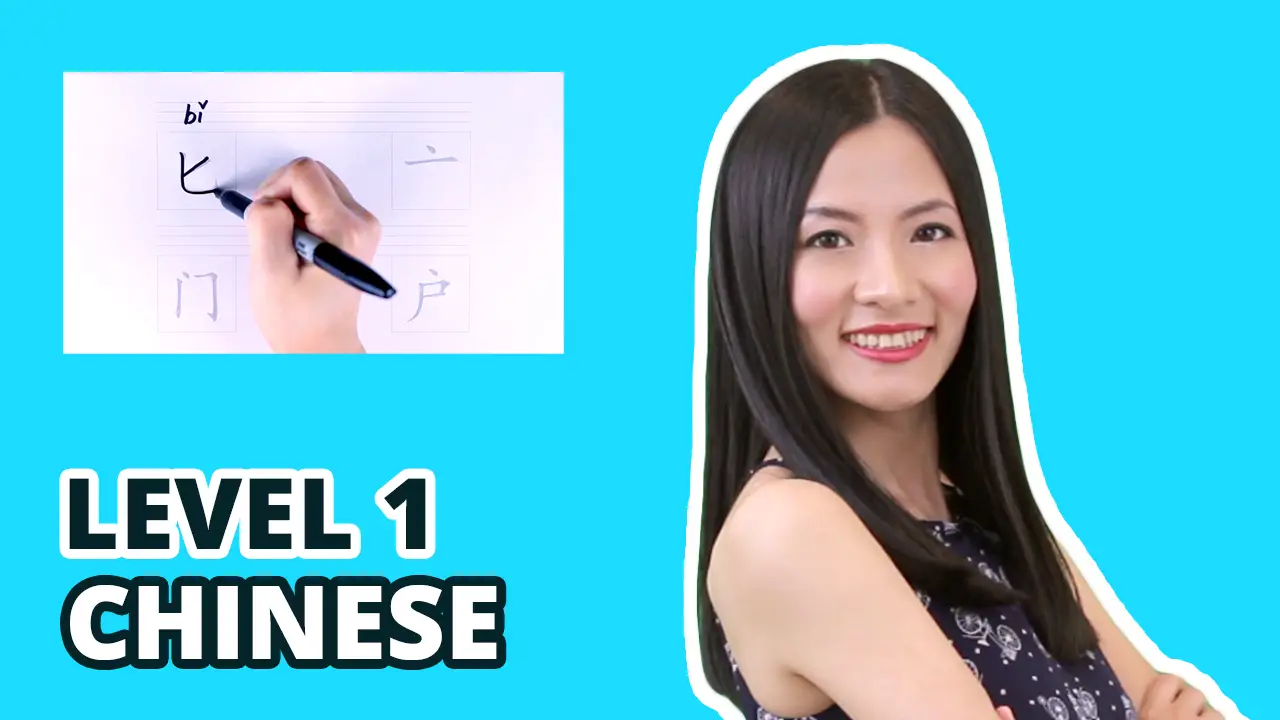Level 1 Lesson 16.1 – What Are You Going To Do On Sunday
Time Words in Chinese: Position in a Sentence and As Modifier of Noun
In this video lesson we'll learn a few sets of Time Words in Chinese, and focus on where to put a Time Word in Chinese sentences.
VOCABULARY
GRAMMAR
Grammar 1: Time Words in Chinese · HSK 1
We have learned some Time Words before:
Today we'll learn more Time Words in Chinese:
Days
| YESTERDAY | TODAY | TOMORROW |
| 昨天 zuótiān |
今天 jīntiān |
明天 míngtiān |
Year
| LAST YEAR | THIS YEAR | NEXT YEAR |
| 去年 qùnián |
今年 jīnnián |
明年 míngnián |
Month
| LAST MONTH | THIS MONTH | NEXT MONTH |
| 上个月 shàngge yuè |
这个月 zhège yuè |
下个月 xiàge yuè |
Week
| LAST WEEK | THIS WEEK | NEXT WEEK |
| 上个星期 shàngge xīngqī |
这个星期 zhège xīngqī |
下个星期 xiàge xīngqī |
| 上周 shàngzhōu |
这周 zhèzhōu |
下周 xiàzhōu |
Grammar 2: Where to put a Time Word in Chinese Sentences · HSK 1
When we put a Time Word in a sentence, the Time Word can give us information about when the action takes place, or when a status persists.
In English the Time Word usually goes at the beginning or at the end of a sentence, but in Chinese it's different, we never put a Time Word at the end of a sentence. For example these are sentences with the wrong placement of Time Words in Chinese:
wǒmen qù Běijīng lǚyóu míngnián我们去北京旅游明年。
we (will) go to Beijing to travel next year
So where to put a Time Word in Chinese sentences? We usually① put a Time Word after the Subject and before the Predicate, which could be a verb(phrase) or an adjective (phrase):
Subject + Time Word + Predicate (+ Object)
These are some typical sentences with Time Words in Chinese:
- wǒmen míngnián qù Běijīng lǚyóu
我们明年去北京旅游。
we (will) go to Beijing to travel next year - tā péngyou zuótiān hěn bùgāoxìng
他朋友昨天很不高兴。
his friend was very unhappy yesterday - nǐ xiàge xīngqīwǔ gěiwǒ dǎdiànhuà, hǎoma
你下个星期五给我打电话,好吗?
you give me a call next Friday, okay? - Xiè Lǎoshī shànggeyuè búzài Fǎguó
谢老师上个月不在法国。
Teacher Xie was not in France last month
❖ NOTE: ① Time Word can be used before the Subject as well, however for Beginner Chinese Level, we consider it a variation. When using a language, it is very common to have multiple acceptable variations for one type of expression. At beginner level, we recommend students to stick with the most common way of expression and gradually develop their language skill and be able to understand and use all variations. In more advanced levels, when we introduce a new grammar point, we will include more variations.
Grammar 3: Time Words as Modifier of Noun (Phrase) · HSK 1
Remember we learned that sometimes a Noun can be used as a modifier of another Noun? For example:
- Hànyǔ shū 汉语书 Chinese language + book / Chinese book
- Zhōngguó cài 中国菜 China + dish / Chinese food
Since Time Words are also nouns, they can be put before another noun (phrase) to function as a modifier by using the Descriptive Particle 的 between them:
Time Word + 的 + Noun (Phrase)
For example:
- shàngzhōu rì de diànhuà
上周日的电话
last Sunday's phone call - míngnián de Hànyǔkè
明年的汉语课
next year's Chinese classes
Grammar 4: More Than One Time Words Together · HSK 1
When there are more than one Time Words together, the "bigger" ones go before the "smaller" one - the same rule as words that refer to places, the "bigger" places go before the "smaller" places. For example:
- xiàgeyuè wǔhào wǎnshàng bādiǎn
下个月五号晚上八点
next month the 5th, evening 8 o'clock - míngnián jiǔyuè yīrì
明年九月一日
next year September 1 - shàngzhōusì zǎoshàng qīdiǎn 'èrshí fēn
上周四早上七点二十分
last Thursday 7:20 am
3 Comments
Leave a Reply
You must be logged in to post a comment.

As someone who spent a lot of time ‘acquiring’ bits and pieces of spoken Chinese without any formal learning of reading or writing, it’s such a relief to finally learn these ‘time sequencing’ topics more concretely (same with the ‘relative positioning’ topic from the previous lesson). I think the idea of time flowing down (from above and going down to underneath) doesn’t really exist so literally in English. Thinking in terms of the English words ‘next’ and ‘last’ can interfere with understanding the use of 下and 上 in this context. Anyway, all that just to say that I’m grateful and that Lessons 15 and 16 have been very much appreciated.
As always you are able to teach topics with more details than others. So even having studied the topic of time intensively the last month at my language school, I was again enlightened by you.
Great! Thank you!
maybe instead of state, “period”???